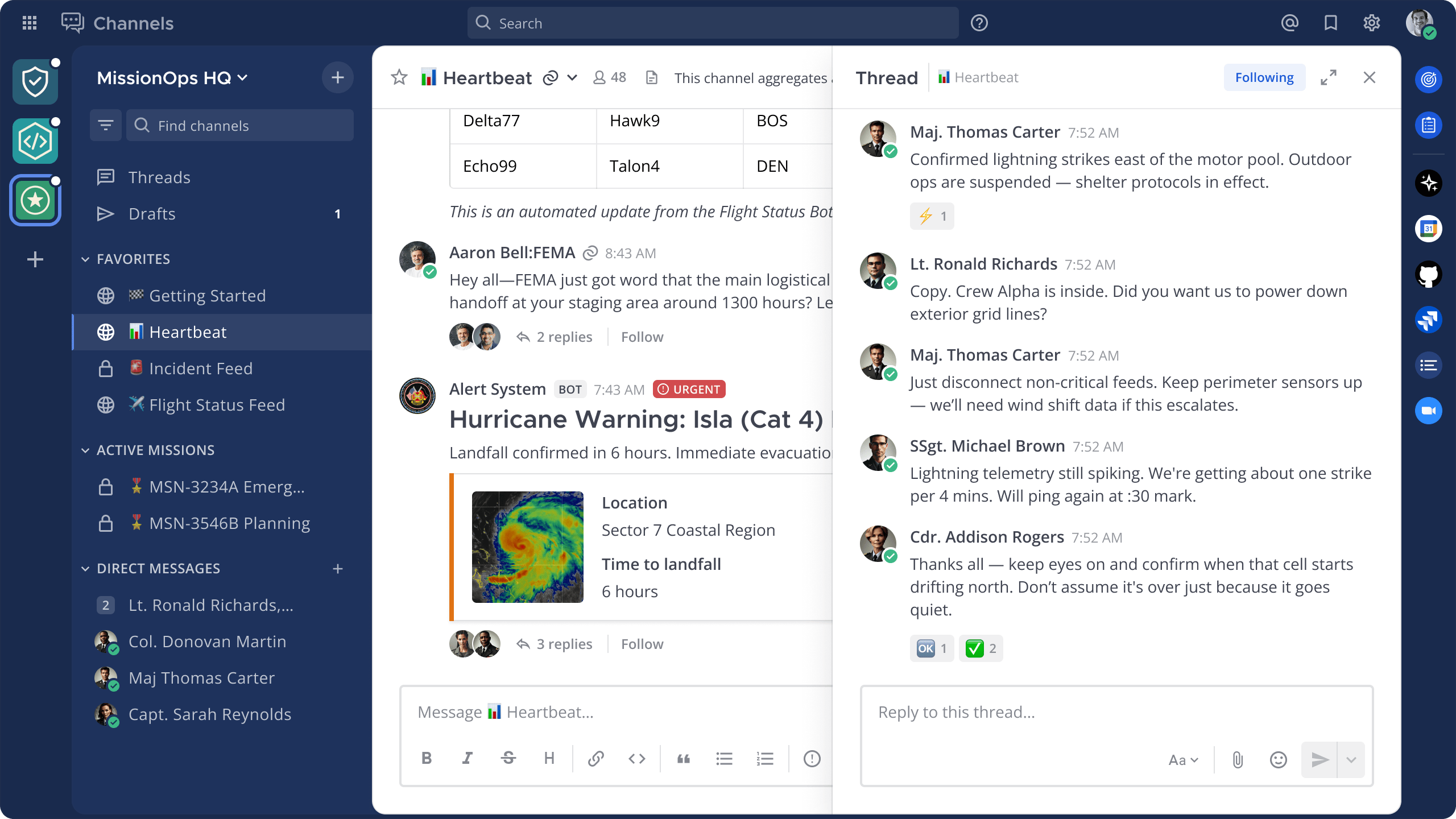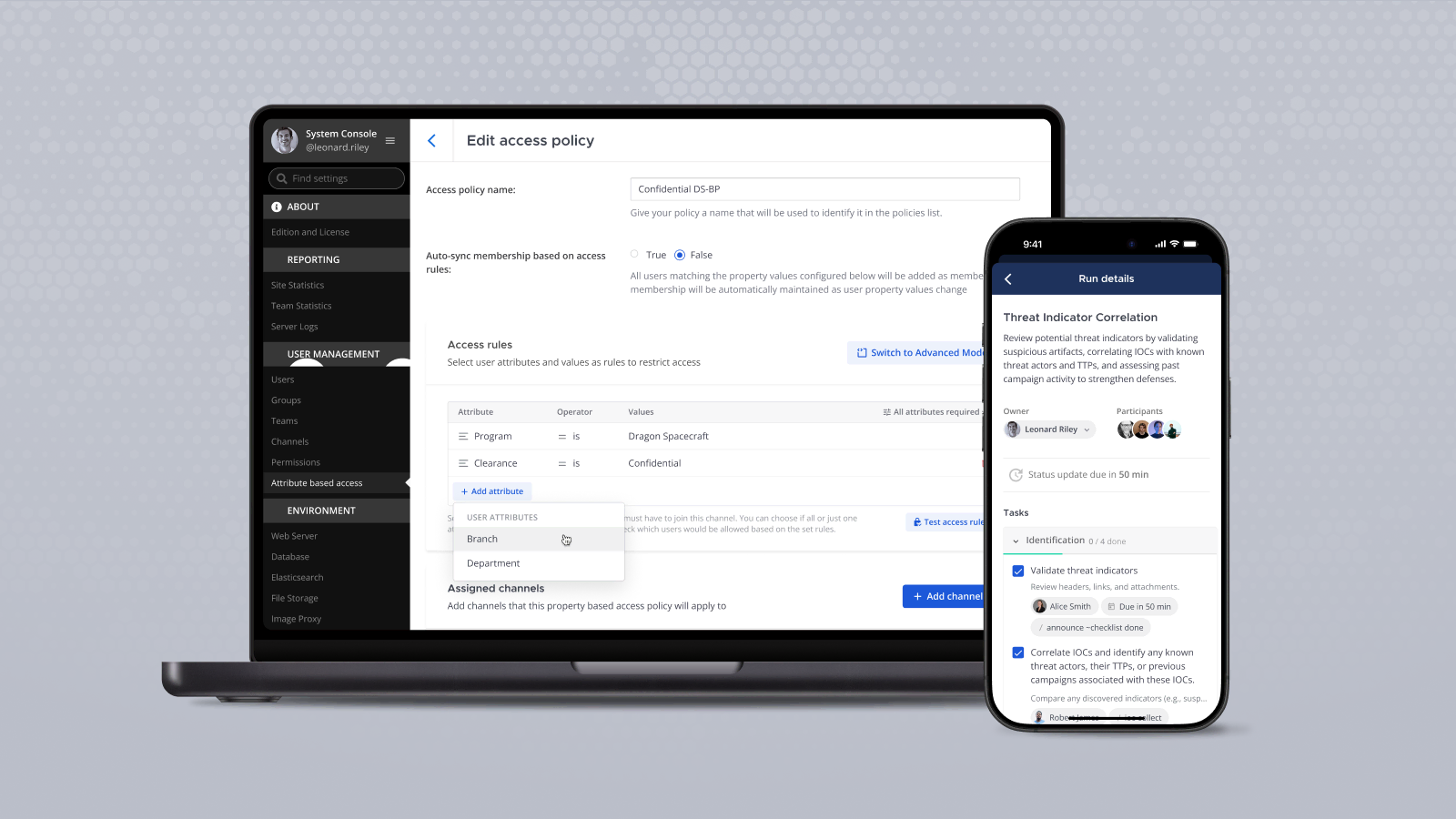
4 reasons you need a Slack alternative
As a popular business messaging solution, Slack is well-suited for general collaboration, particularly among smaller teams.
Though the platform does offer several advantages — it’s user-friendly, it supports team collaboration, and organizations don’t have to manage the software or infrastructure themselves — there are certain areas where this SaaS solution falls short.
Chief among them? Built for general business collaboration, Slack struggles to support mission-critical work. At the same time, Slack was built for general businesses, making it harder to adapt to the unique way each organization operates.
In this piece, we examine four key use cases that require a Slack alternative.
1. Mission-critical ChatOps processes
Since Slack is delivered through the cloud, it can’t always be counted on to provide the level or reliability and availability mission-critical ChatOps require. In the event Slack’s service experiences outages, downtime, or performance issues, team members can be cut off from each other when every minute of response time is critical.
While Slack integrates with many third-party tools, ensuring seamless integration may require extensive customization and configuration efforts.
To maintain focus and resiliency, teams managing mission-critical ChatOps processes are best off deploying a flexible, secure, highly customizable collaboration solution they can self-host or deploy in a private cloud, giving them control.
2. Purpose-built collaboration hub
While Slack is a good option for general team communication, it falls short as a purpose-built collaboration hub due to its proprietary, closed-source nature and lack of customization options. Unlike open core solutions, Slack’s closed ecosystem restricts teams from tailoring the platform to their unique collaboration needs, making it that much harder to best support critical workflows.
As a multi-tenant enterprise collaboration platform, Slack can struggle to meet the specific customization and integration needs of mission-critical workflows. Since manual processes for integrating information are too slow and error-prone to keep pace with escalating operational needs, organizations that want to deploy an actual purpose-built collaboration hub need a more flexible solution.
For example, CERN — a research institute that studies the fundamental structure of the universe — has integrated more than 100 tools into Mattermost, a secure collaboration hub designed for technical and operational teams. By bringing together every toolchain in their mission-critical workflows in one place, CERN has been able to centralize and surface important information, automate repeated workflows, and enable fast, context-driven decision-making.
3. Data sovereignty
Organizations operating in industries with high security and compliance requirements — including finance, healthcare, utilities, military, and the public sector — need to do everything they can to protect their data. For this reason, many are prioritizing investments in data sovereignty.
Since self-sovereign collaboration requires organizations to maintain complete control over their data and infrastructure, Slack’s architecture — including centralized servers and proprietary software — gives the platform significant control over user data, which completely contradicts the principles of data sovereignty. At the same time, it also makes it harder to ensure compliance with ever-evolving regulations.
What’s more, Slack’s terms of service and privacy policies may put restrictions on how users can access, share, and manage their data within the platform. Organizations that choose Slack may have limited control over key functionality including data retention, deletion, and export, undermining their autonomy and sovereignty over their own data.
On top of this, Slack’s integrations with third-party apps may further complicate data sovereignty by introducing additional data sharing and privacy concerns. For example, users may expose their data to third parties without even realizing it, losing control over how it’s used or protected.
Organizations prioritizing self-sovereign collaboration should look for solutions designed with autonomy and data sovereignty top of mind. If self-sovereign collaboration is a top priority, they should look for open core platforms that can be self-hosted on their own infrastructure or deployed in a private cloud or air-gapped environment and provide complete data control, with full source code access. It’s the only way an organization can be confident they’re fully self-sovereign and truly own their data.
4. Out-of-band incident response
As a SaaS solution, Slack relies on internet connectivity. During emergencies or outages, that might not always be available. In situations where time matters most — like network failures or cyberattacks — relying on public internet-dependent platforms like Slack can be risky. Similarly, while Slack aims for high availability, the platform’s reliability can be concerning during critical incidents. Like any other SaaS platform, Slack is not immune to service disruptions or outages — which could hinder incident response efforts during emergencies.
For out-of-band incident response, organizations are best off opting for more resilient and secure communication channels — those designed to keep security teams online even when other systems are unavailable. Such alternatives offer greater assurance for availability, security, and privacy — particularly when they’re self-hosted. As a result, they help ensure time-sensitive incident response efforts can proceed as planned even during the most challenging of circumstances.
Need a Slack alternative or replacement? Try Mattermost.
As a highly secure, open core collaboration solution that can be self-hosted internally or deployed to a private cloud or air-gapped environment, Mattermost helps technical and operational teams support, accelerate, and protect mission-critical workflows — all while giving them complete control over their data and their instance.
From facilitating out-of-band incident response and DevSecOps processes to ensuring data sovereignty and high availability for mission-critical workflows, Mattermost is the ideal Slack alternative for organizations with the highest security, privacy, and compliance requirements.
To learn more about how you can increase focus and bake more resiliency into your operations with Mattermost, get in touch with us today.




